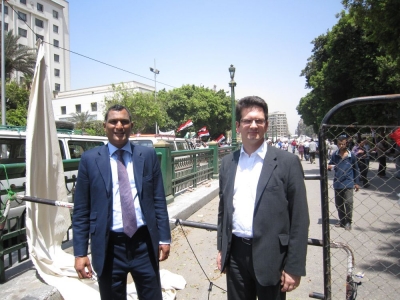MP Steve Baker writes about Egypt visit for Conservative Home
Sábado, 6 Agosto 2011
Steve Baker MP: Egypt teeters, exposing lessons for the UK
29 July 2011
Under the auspices of the Iman Foundation, Syed Kamall MEP and I travelled this week to Cairo to promote pluralism and the principles of a free society. We delivered two successful seminars on democracy, freedom and tolerance - one for senior political and academic figures and one for young activists - in addition to meeting members of Egypt's political class. These seminars followed Syed's previous work in Cote d'Ivoire based on Principles for a Free Society, a short book written by British academic Dr Nigel Ashford.
Egypt has about 28 significant parties with more than a hundred further relevant registered organisations. Many seem to have coalesced around characters, not political ideas. This may be normal for a fledgling democracy but it leads to high levels of fragmentation between and within parties. For example, the Gathering Party includes Marxists and liberals, secularists, Christians and Muslims, united around a programme based on equality which may go beyond the essential moral, political and legal equality required for a free society.
Low participation is a problem and there was a sense that there is too little time to share and entrench political ideas before the coming elections. In that context, the numerous political parties find themselves weak. The Freedom and Justice Party of the Muslim Brotherhood was thought by those we met to be the best organized and strongest political force and their social action projects perhaps put them ahead of rivals in the hearts and minds of the Egyptian people.
There is a division between the old elites, who continue to provide leadership, and young activists, who combine exuberant, desperate optimism and a hunger for ideas with an inability to organize to deliver on their own demands. Mass poverty and illiteracy combined with faith, or at least respect for faith leaders, tend to promote support for the Freedom and Justice Party of the Muslim Brotherhood.
So, while the established, moderate elite and an optimistic youth fear a popular victory for political Islam, they have so far been unable to create a counterbalancing force. Into this we threw three vital ideas and as many copies of Ashford's book as we had been able to carry over.
First, the idea that the dangers of democracy - the tyranny of the majority, demagoguery and special interests - must be mitigated by the classical rule of law, individual rights, limited state power and regular, free and fair elections.
Second, that freedom is the opportunity to act as you see fit, provided you do not harm others. Freedom is not power and it is not subjection to the social system and objectives preferred by paternalistic ruling class. It is not the right to oppress others. Freedom is in everyone's interests, bringing spontaneous order, prosperity and progress.
Finally, that toleration is not agreement, but refraining from the use of power against those with whom you disagree profoundly. It is not the absence of morality, or a manifestation of subjective morality, but the product of co-existing, grounded and objective moralities about which there is genuine disagreement. Toleration is an important expression of commitment to individual freedom. It is not the legal enforcement of a particular consensus about what constitutes an acceptable opinion.
I returned to the UK convinced of two things. Egypt teeters on rejecting that secular liberal democracy which might deliver freedom, which would be a tragic abandonment of the essence of the revolution. Moreover, on carefully revisiting the principles of a free society, I became more deeply convinced that, for all our relative freedom and prosperity, the UK cannot be considered a consistent embodiment of the principles of a free society, so many of which have their philosophical origins here.
Commenting on the article, Alistair Burt MP, UK Minister for the Middle East, said:
I am very grateful to Steve for his observations, which sum up well part of a very complex situation. I had the chance to visit Cairo last week also, for talks with the new Foreign Minister and those representing new political parties and business. I found a similar sense of confusion for the future, but real efforts being made to find common ground, which explains why the huge demonstration in Tahrir Sq on Friday was peaceful, through much discussion between different parties in the days before.
The Army's position remains strong, but it has serious dilemmas to resolve which most people here are well aware of, though they speak little about it. Whilst the Army holds the ring at present, and thank God did not take the course of the armies in Libya or Syria, they have to work out how to devolve political power without risking too great an exploration of their past. This will be for them and the Egyptian people to resolve.
These reports from colleagues - of all parties-, and others who visit, are a real assistance to Ministers understanding of the extraordinary events in the Arab world, and I look forward to more from MPs by the end of the recess.
By the way, Tahrir Sq at present is an extraordinary and exhilarating place. I went there non-announced at midnight on Wednesday to find it full of thousands, most split up into their own tented areas, with fierce but peaceful argument and discussion everywhere. No sense of threat to an outsider wandering through, nor challenge by the young men responsible for security checks as people enter the square. Hard to imagine there is anywhere else like it in the world today.